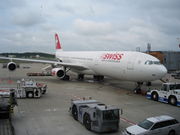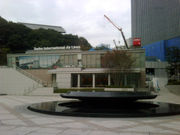Swiss International Air Lines
 |
||||
|
||||
| Founded | 2002 [1] | |||
|---|---|---|---|---|
| Hubs | Zürich Airport | |||
| Focus cities |
|
|||
| Frequent-flyer program | Miles & More | |||
| Member lounge | HON & Senator Lounge | |||
| Alliance | Star Alliance | |||
| Fleet size | 86 (+35 orders) | |||
| Destinations | 80 | |||
| Company slogan | Swiss made. | |||
| Parent company | Deutsche Lufthansa AG | |||
| Headquarters | EuroAirport Basel-Mulhouse-Freiburg near Basel, Switzerland Register: Basel[2] |
|||
| Key people | Harry Hohmeister (President and CEO) | |||
| Website | Swiss.com | |||
Swiss International Air Lines AG (short: Swiss) is the principal airline of Switzerland operating scheduled services in Europe and to North America, South America, Africa and Asia. Its main hub is Zürich Airport (ZRH).
Swiss is a subsidiary of the German airline Lufthansa. It is headquartered at EuroAirport Basel-Mulhouse-Freiburg near Basel, Switzerland. Swiss also has an office at Zürich Airport in Kloten, Switzerland.[3] The company's registered office is within the city of Basel.[4]
The airline uses the IATA Code LX that it inherited from the Swiss regional airline Crossair (Swissair's code was SR). The ICAO code is SWR, inherited from Swissair (Crossair's was CRX), in order to keep international traffic rights.
Contents |
History
Beginnings
The airline was formed after the 2002 bankruptcy of Swissair, Switzerland's former flag carrier. The new airline's losses totaled $1.6 billion from startup until 2005. Swissair's biggest creditors, Credit Suisse and UBS, sold part of Swissair's assets to Crossair, the regional counterpart to the transatlantic Swissair (both Swissair and Crossair were under the same holding company, called SAirGroup). Crossair later changed its name to Swiss, and the new national airline started its operations officially on 31 March 2002. The airline was first owned by institutional investors (61.3%), Swiss Confederation (20.3%), cantons and communities (12.2%) and others (6.2%). Swiss also owns subsidiary companies Swiss Sun (100%) and Crossair Europe (99.9%). It has a total of 7383 employees.[5]
Swiss International Air Lines, or "Swiss", was founded from the remains of Crossair. Crossair had 40% of its income come from the defunct Swissair. The first year was plagued with loss and the Swiss government gave the airline the then-equivalent of $1.5 billion, which was used up within two years.
According to Marcel Biedermann, the managing director intercontinental markets for Swiss, there were three possibilities: stay independent as a niche carrier, shrink to an unrecognisable level, or attach onto another airline group. The last choice was taken. Swiss talked to Air France-KLM, British Airways, and Lufthansa. However, Swiss was tied up with debt and an uncertain future, and seemed to be an unattractive investment. After merging with KLM, Air France said they were too busy to deal with Swiss joining them. Lufthansa wanted to take over, but the Swiss people did not want that. British Airways was open, and Oneworld partners thought Zürich Airport would be a viable alternative hub for London Heathrow.
After almost a year of disputes, Swiss was finally accepted into the Oneworld airline alliance, after having been blocked by British Airways, which competes with Swiss on many long-haul routes. On 3 June 2004, Swiss announced its decision not to join Oneworld because they did not want to integrate their current frequent flyer program into British Airways' Executive Club. Furthermore, Swiss thought the relationship was one sided, where British Airways sapped out the benefits of the airline, but they would get no return.
Recovery
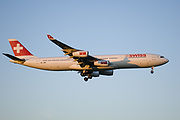
The airline annually halved its losses, and in 2006 received a net profit of $220 million. The net profit for 2007 was $570 million. Biedermann stated in the March 2008 edition of "Airways", that "this was the beginning of getting our house back in order." He said that help was needed and looked up to Lufthansa as a comparison, so their coming together was natural, even with their differences. Even with the smaller network, Swiss carries the same number of passengers as they did in 2002.
On 22 March 2005, Lufthansa Group confirmed its plan to take over Swiss, starting with a minority stake (11%) of a new company set up to hold Swiss shares called Air Trust. The takeover was completed on the 1st of July 2007 and the Swiss operations were gradually integrated with Lufthansa's from late 2005. Swiss joined the Star Alliance on 1 April 2006, when it also became a member of Lufthansa's Miles and More frequent flyer program.
The airline has set up a regional airline subsidiary called Swiss European Air Lines. This carrier has its own air operator's certificate and operates a non-Airbus fleet. The two independently operating divisions Swiss AviationTraining and Swiss WorldCargo (belly capacity of passenger planes) are also owned by Swiss.
In 2008 Swiss International Air Lines acquired Edelweiss Air[6] [7] and Servair[8] - now Swiss Private Aviation.
The Swiss brand still retains a high respect with travellers, as can be seen by the company coming top of the upmarket Condé Nast Traveller readers' survey[9] for short haul flights in 2008.
In 2007, Swiss placed order for 9 Airbus 330-300 aircraft to eventually replace the existing fleet of its 9 A330-200 aircraft. The A333 would be more environmentally friendly and have 3-class seating. With each arrival of an A330-300 jet which began in April 2009, one A330-200 will be retired from the fleet. The first A330-300 jet was put into service from Zurich to New York (JFK). As of spring 2010, Swiss operates five A330-300s on routes from Geneva to New York (JFK), as well as Zurich to New York (JFK), Delhi, Mumbai, and Dubai & Muscat. As of April 2010, the A330-300 will fly from Zurich to Nairobi & Dar es Salaam and Yaoundé & Douala. The remaining order of A330-300 aircraft will be joining the fleet by 2011.
Lufthansa Group takeover
Following Lufthansa Group takeover, the regional fleet was changed from Crossair's Embraer ERJs and Saabs to Avro RJs (also known as BAe 146), which are flown by a wholly-owned subsidiary, Swiss European Air Lines. The rest of the fleet, apart from the regional jets, was also rationalised and is now all Airbus.
The airline reconstruction also caused Swiss to renegotiate their supplier contracts, which include ground handling, maintenance, food service, and labour.
The shareholders of Swiss received a performance-based option for their shares. Payment will be in 2008, and the amount will depend on how well Lufthansa's shares compare with competitors' shares. Lufthansa continues to maintain Swiss as a separate brand.
Subsidiaries
The following companies are part of the Swiss International Air Lines Group:
- Edelweiss Air
- Swiss AviationSoftware
- www.swiss-aviation-training.com
- Swiss European Air Lines
- Swiss PrivateAviation
- Swiss VirtualAirline
- Swiss WorldCargo
Destinations
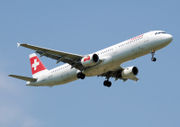
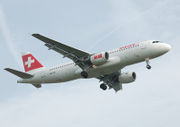
In 2009, the airline announced a major expansion at EuroAirport Basel-Mulhouse-Freiburg in an attempt to win back market share from budget airlines using the airport.
Note: This list includes Star Alliance members (*).
|
|
|
Fleet
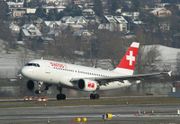
.jpg)
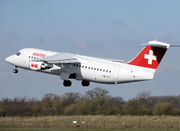
The Swiss International Air Lines fleet (including Swiss European Airlines) consists of the following aircraft (as of 21 June 2010):[10][11][12]
| Aircraft | In Fleet | Orders | Passengers (First/Business/Economy) |
Notes |
|---|---|---|---|---|
| Airbus A319-100 | 7 | 0 | 108 (0/60/48) | |
| Airbus A320-200 | 20 | 2 | 136 (0/64/72) | |
| Airbus A321-100 | 6 | 0 | 176 (0/68/108) | |
| Airbus A330-200 | 4 | 0 | 229 (0/42/187) 196 (12/42/142) |
|
| Airbus A330-300X | 8 | 2 | 236 (8/45/183) | Deliveries: 2010 |
| Airbus A340-300E | 15 | 0 | 228 (8/48/172) | |
| Avro RJ100 | 20 | 0 | 97 (0/40/57) | Operated by Swiss European Air Lines Dubbed Jumbolino To be replaced by: Bombardier CS100 |
| Bombardier CS100 | 0 | 30 | TBA | Entry into service: 2014 (will be launch customer) To be operated by Swiss European Air Lines Replacing: Avro RJ100 |
| Boeing 737-800 | 1 | 0 | 52 (0/52/0) | Operated by PrivatAir Business class-only |
| Fokker 100 | 6 | 0 | 100 (0/0/100) | 4 operated by Helvetic Airways 2 operated by Contact Air |
| Total | 86 | 35 |
The average age of the Swiss International Air Lines fleet is 9.6 years (as of 30 September 2009) The aircraft fleet is to be renamed after local towns and cities over the next two years. The names will be featured on the aircraft fuselage, with cabin interiors showing the coat of arms of the town or city. The latest fleet addition, an Airbus A330, is the first to follow this scheme, as Bern.[13]
Six Airbus A340 aircraft are to be added to the fleet. The first of which is an ex-Air Canada plane [2]. Three more ex-Air Canada A340s are to be added along with two ex-Austrian Airlines to increase frequencies on existing routes and to launch new routes for summer 2008.
Two Airbus A330 aircraft are also being added to the fleet. The first one will replace an Airbus A300-600 in November 2006 which was leased from Hapag-Lloyd, and the second in mid-December 2006, both to increase route frequencies.
The short haul fleet is also expected to expand with plans confirmed in September 2006 to add two Airbus A321 and one Airbus A320 aircraft.[13] To avail the market chances, Swiss added 2 additional Airbus A320 aircraft to their fleet earlier than planned. The aircraft were added in autumn 2007 and were not new-build aircraft, but rather former Swissair aircraft that were leased out for six years.
In addition to Swiss' own fleet a number of codeshare agreements are in effect. These include 3 Fokker 100 aircraft operated by Swiss airline Helvetic Airways, two Fokker 100 operated by Lufthansa Regional partner Contact Air, one BAe 146-300 operated by British airline Flightline (UK), and one Saab 2000 operated by Swiss regional airline Darwin Airline. These aircraft operate from Zürich on routes to Birmingham, Manchester, Prague, Brussels, and Lugano.
On 20 September 2007, Lufthansa confirmed an order for 41 aircraft.[14] Two of the ordered A320 and the 9 orders for A330 aircraft are intended for Swiss.
On 11 March 2009, Swiss announced that in 2014, it plans to gradually replace the current RJ100 fleet with aircraft of the Bombardier CSeries. The replacement of the current 20 aircraft is planned to take two years while an additional 10 aircraft will be delivered thereafter to allow for capacity expansion. The new aircraft will allow Swiss to continue serving restricted destinations such as London City Airport. The Lufthansa Group is a launch customer for this aircraft type.[15]
One MD-11 aircraft formerly used by Swiss had the Chinese character Ruì (瑞), from the Chinese translation of Switzerland, Ruìshì (瑞士), on the tail fin instead of the cross. It came from the former Swissair subsidiary Swissair Asia, which was formed to allow for Swissair to serve the Republic of China and the People's Republic of China.
Head office
Swiss International Air Lines is headquartered at EuroAirport Basel-Mulhouse-Freiburg in Saint-Louis, Haut-Rhin, France,[16][17] near Basel, Switzerland.[5] It is located in the Swiss section of the airport.[18] The current Swiss International Air Lines head office was formerly the head office of Crossair. In 2002 the name "Crossair" was replaced with "Swiss Internatonal Air Lines" on the head office building.[19] As of 2004 the Basel area offices housed about 1,000 employees, while the Zurich area offices housed about 850 employees. When Swiss started as a company, about 1,400-1,500 worked at the Basel offices.[20]
References
- ↑ http://www.staralliance.com/en/meta/airlines/LX.html
- ↑ "Swiss International Air Lines AG." Office du Registre du commerce du canton de Bâle-Ville. Retrieved on 13 March 2008.
- ↑ "Swiss International Air Lines Zurich." Swiss International Air Lines. Retrieved on 24 September 2009.
- ↑ "Impressum." Swiss International Air Lines. Retrieved on 22 June 2010. "Rechtssitz der Gesellschaft Swiss International Air Lines AG Malzgasse 15 CH-4052 Basel."
- ↑ 5.0 5.1 "Swiss - Facts & Figures". http://www.swiss.com/web/EN/about_swiss/company/Pages/facts_figures.aspx. Retrieved 2010-02-23.
- ↑ http://www.swiss.com/web/EN/about_swiss/media/press_releases/2008/Pages/pr_20080208.aspx Official press release be Swiss International Airlines "Kuoni and SWISS enter into strategic partnership"
- ↑ http://www.swiss.com/web/EN/about_swiss/media/press_releases/2008/Pages/pr_20080417.aspx Official press release be Swiss International Airlines "WEKO approves the acquisition of Edelweiss Air by SWISS"
- ↑ http://www.swiss.com/web/EN/about_swiss/media/press_releases/2008/Pages/pr_20080718.aspx Official press release be Swiss International Airlines "SWISS acquires Servair to operate as Swiss Private Aviation"
- ↑ http://cntraveller.com/ReadersAwards/2008/Airlines/
- ↑ [1]
- ↑ Swiss International Air Lines fleet list. Retrieved 2010-06-21.
- ↑ Swiss European Airlines fleet list at ch-aviation.ch. Retrieved 2009-12-27.
- ↑ 13.0 13.1 Airliner World January 2007
- ↑ "Lufthansa to order 41 Airbuses including nine A330s for Swiss" Flight Global, 20/09/07
- ↑ "Swiss Investing in Further Fleet Renewal from 2014 On" Swiss International Airlines, 31/01/10
- ↑ "SWISS unveils foundation for solid future." Swiss International Air Lines. Retrieved on 1 July 2010. "The Annual Results Press Conference takes place at 11:00, Tuesday, March 23 at the SWISS head office at Basel EuroAirport."
- ↑ "Plan interactif." Saint-Louis (Haut-Rhin). Retrieved on 25 September 2009.
- ↑ "Swiss International Air Lines Basel." Swiss International Air Lines. Retrieved on 24 September 2009.
- ↑ "INDUSTRY BRIEFS." Airline Industry Information. 2 July 2002. Retrieved on 12 January 2010. "According to a company statement, the new name replaces Crossair at the corporate headquarters in Basel."
- ↑ "Wenn die Direktion geht, folgt dann der Rest?" Basler Zeitung. Tuesday 27 July 2004. No. 173. "Ursprünglich arbeiteten am Hauptsitz in Basel rund 1400 bis 1500 Leute, heute sind es noch rund 1000 (das fliegende Personal nicht mitgezählt) – der meiste Teil der Stellen fiel der Restrukturierung vom letzten Jahr zum Opfer. In Zürich arbeiten derzeit rund 850 Personen am Boden."
Further reading
- Donohue, Ken. "Swiss continues a proud tradition." Airways Magazine: A Global Review of Commercial Flight. March 2008: 22-23, 25, 28.
External links
- Official website
- Swiss International Air Lines - YouTube
- Swiss WorldCargo – Cargo operations
- BBC article on the Lufthansa takeover
|
|||||||||||||||||||||||||||||||||||||||||||||||||||||||||||||||||||||||||||||||||||||||||||||||
